It’s that time: time to talk about my faves in TV and movies. Once again, this year, I’m gonna start with TV, because my favourite shows frankly stand head and shoulders above my favourite movies.

Number 5: Watchmen. When I first heard that they were planning a show based on the Watchmen comic series, I was pretty skeptical. Even more so when I heard that it was going to be a sequel/continuation of the original story. This show ended up being surprisingly good. I can’t imagine what it would have been like to see the show without knowing the original comic series, but I didn’t really see anyone expressing confusion on the Twitters. The show has some weaknesses: I mostly didn’t think that the storyline involving the “Lord of a Country Estate” was particularly compelling. And while the show seemed to want me to like the various cop characters like Red Scare and Pirate Jenny, they never really overcame the stank of ACAB.
I feel like the story is done, now, and that there shouldn’t be more seasons, but if they do more seasons and keep the quality, I’ll be right there. Importantly, a second season could help us resolve a key storyline that needs to be completed: we need to know what’s going on with Lube Man.
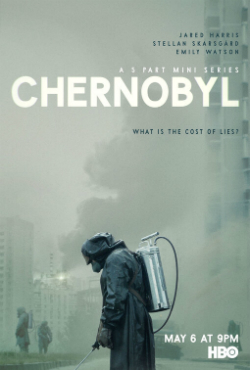
Number 4: Chernobyl. Like Watchmen, Chernobyl is an HBO series. I bought a season’s pass on iTunes very soon after folks were raving about it, but I didn’t expect to love it as much as I did. I expected the structure to be different: I expected the story to slowly build up to the cataclysmic explosion in the final episode. In fact, after an introductory scene set two years after the original accident, the explosion is almost the first thing that happens. In fact, we meet many of the characters after the explosion. The focus, then, ends up being on the Herculean and sacrifice-demanding effort it took to contain the damage wrought by the accident.
I was talking to a friend about how the themes spoke to modern concerns around things like climate change and politics, and I confess that the show pretty much persuaded me that we’re fucked. There’s a crucial scene in the second? episode: Boris Shcherbina is talking to a group of reactor workers, needing to entice 3 of them to volunteer for a vital mission that’ll probably end in their deaths, and one of them asks, “why should we do this?” He says, “You’ll do it because it must be done. You’ll do it because nobody else can. And if you don’t millions will die. If you tell me that’s not enough, I won’t believe you. This is what has always set our people apart: a thousand years of sacrifice in our veins. And every generation must know its own suffering. I spit on the people who did this. And I curse the price I have to pay. I’m making my peace with it. Now you make yours.”
Our society doesn’t have a tradition of sacrifice: we have a tradition of consumption and comfort. So, y’know, getting people to accept minor inconvenience for the greater good is going to be impossible. It’s so hard to get people to take fucking transit instead of driving. We wouldn’t go in to a burning reactor to save millions of lives.
I bought the series off of iTunes, and decided to check out the first episode and, wham, I binged it. It was completely engrossing.
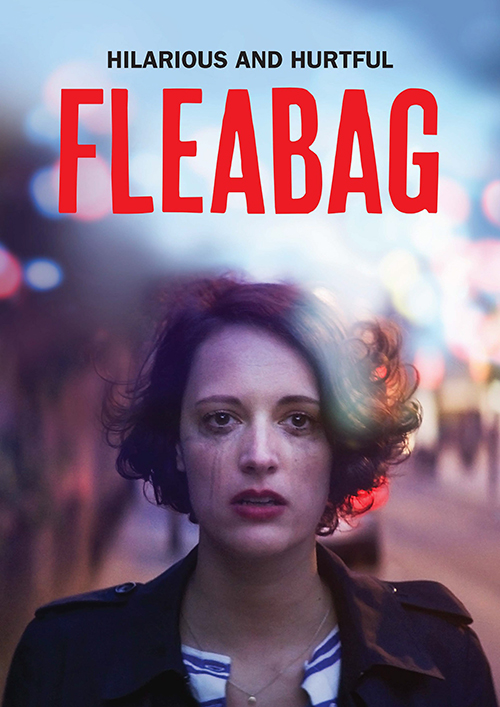
Number 3: Fleabag. I almost also included Killing Eve on the list again this year. It was a long time before I realized that both shows were written by Phoebe Waller-Bridge (who also stars in Fleabag), and that’s why both series had a type of humour and quirkiness that were exactly my taste. Of the two, I think Fleabag is the one I like better, especially given that the second season of Killing Eve was weaker than the first season, whereas I think season 2 of Fleabag was even stronger than season 1.
There’s a scene at the beginning of the second season: Fleabag is out to dinner with her family, despite being on the outs with them, and she tells the viewers that she’s just going to be there and not really engage. But then it ultimately ends with a fist fight. And catharsis. And strong bonds of sisterhood. It’s an incredible piece of writing.
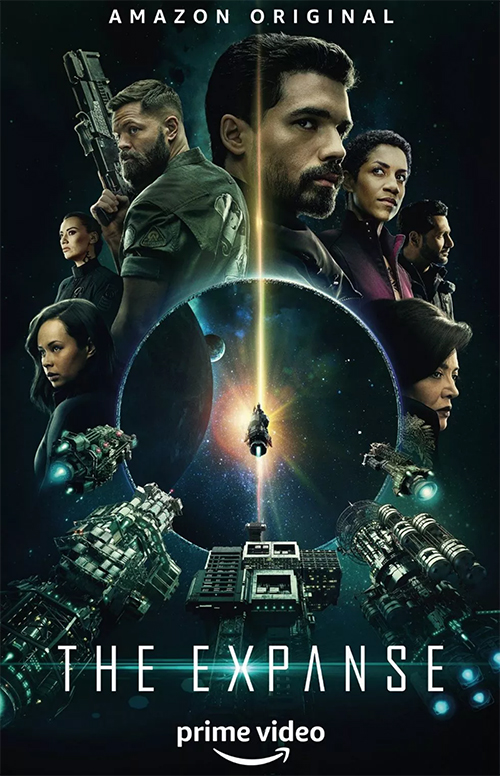
Number 2: The Expanse. I’ve had The Expanse on my top 5 list for the last few years, and this year was another incredibly strong outing for the show. I was pretty sure it was going to be on the list again this year, but they made me wait sooooooo long for the latest season.
There was a lot to love about this season: Drummer is in the opening credits now, and I loved all the storylines involving Medina Station. I loved seeing Mars, and seeing how Martian society is changing because of the Ring. (I also really loved seeing how upbeatly authoritarian their society is — including all the “join the MCRN” ads playing on background TV sets).
Amos continues to be a real masterclass study of a damaged character who never really tells you about his damage, but it’s completely obvious. I’m still Team OPA, but I love how the show is not afraid to show you the unseemly side of the OPA. Murtry is a much more dangerous adversary than we’ve had in the past, but he’s a well-written character with a comprehensible agenda.
One sad thing: they re-cast Avasarala’s husband, Arjun. Not a huge deal, and the actor was more than capable, but he really felt like a different character. The season 2 episode where Chrisjen and Arjun are basically saying goodbye to each other via video chat with an annoying earth-to-the-moon communications delay is one of my favourite Arjun moments.
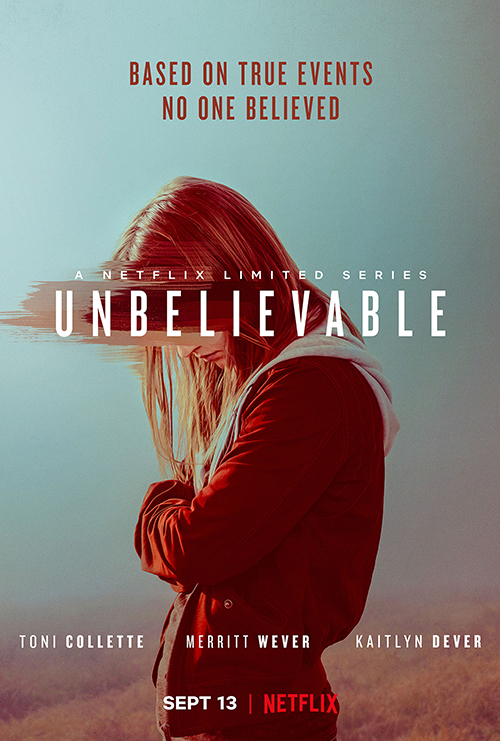
Number 1: Unbelievable. I saw a trailer for this, and thought: “oh, a cop procedural involving a serial rapist.” And, okay, it is that, but it’s also much more. It’s based on a true story, one that was excellently written-up by a Pro-Publica writer. At the beginning of the story, a young woman, Marie, is raped and, basically, isn’t believed by the police or the people around her. The first episode of the show, where we see her initial interactions with the police and the other authority figures in her life is pretty hard to watch, as they basically play out her re-traumatization.
The show makes some really good, and unconventional, choices about depicting the serial rapist. Scenes are never filmed through his eyes. We almost-never see the actual rapes; we do get brief memories of the rape incident, always through the perspective of the women being attacked. The second episode introduces the two female cops who ultimately crack the case, and we see one of them interview another survivor, immediately after her attack. It’s such a night-and-day contrast to the cops in the first episode.
Like Chernobyl, I played the first episode, thinking I would enjoy it over the course of several days. But, no. I raced through it, desperate to see something go right for poor Marie. There’s a scene in the second-last episode: Marie is at a court-ordered therapy session, and she doesn’t want to be there. But the therapist deftly gets her talking about the movie Zombieland, and uses that conversation to get past Marie’s walls. I bawled through this scene.
I think part of my appreciation for this show is that I had so little knowledge of what it was about. I could just watch the story as it unfolded.
There were some other treats in the show: I always enjoy Liza Lapira when she shows up in something, even when it’s a bit of an underappreciated role. And the relationship between the two detectives was just perfect. Devers is a powerful actor, conveying perfectly that sense of “I’m hurting, but I was also never taught to believe that my feelings matter, and therefore I’m trying to avoid making a fuss”. It’s painful to watch.
My only frustration is that I wanted Collette or Wever to call out Det. Parker. There are a couple of scenes in which Toni Collette doesn’t give him an out, when confronted with his fuck-up. From a script point of view, it’s clear that the writers wanted to save the direct confrontation to come from Maria herself. But I still felt like the cops who solved the case weren’t in Parker’s face enough.
Okay. Runners-up.
Killing Eve and When They See Us almost made the top five. And Russian Doll is pretty high up on the list as well.
I’ve been enjoying the Apple TV+ collection of shows, particularly For All Mankind — a show about an alternate-history space race. The Russians have beaten the US to the moon, and now everything’s a competition. The show really takes off in episode 3, just after the Russians put a female cosmonaut on the moon, and US wants to follow suit. The women in the space programme end up being the best characters: I’m especially fond of Molly Cobb, although Ellen Waverly’s story becomes really compelling, too. The show spends a lot of time on sulky-guy Ed Baldwin, but he’s the least interesting character on the show.
The Morning Show, also an Apple TV+ show, is also pretty stand-out. I feel like it was a slower to hit its stride, and I had certain apprehensions along the way. One of the main story elements has to do with a show host who’s fired at the beginning of the first episode for creeping on women in the studio. The way the character was written made me fear that they were setting him up for some kind of redemption arc. But the show ended up being much more critical of the way that power structures enabled creepers than I really expected. The last episode is incredibly powerful.
I enjoyed Carnival Row more than I expected. Mostly, I think, because I enjoyed seeing something new: not a reboot, not part of a brand. Just something new. The last season of Orange is the New Black was probably the best one since the first season, and was quite moving at the end.
And I’ve really been enjoying The Good Doctor, the first season of which ended up being on-sale on iTunes, so I watched that, and quickly moved on to later seasons. The current season has had some ups and downs. I haven’t loved the storyline around Claire, who’s generally the best character of the show, and I actually dislike the way the show is trying to make Reznik more likeable (I liked her as cold and self-interested). And the mid-season finale plays a “but they’re faaaaaaaamily” card in a way I find really tiresome. And Lea’s been delegated to the background. But everything involving Carly has been awesome.
The third season of Berlin Station bugged me. I like spy shows, which are fairly rare, and I liked the way this particular spy show was playing out, but the latest season wrote out a main character in a way that was ham-handed and unsatisfying, and has also dropped in, front-and-centre, the spy story trope that has been done to death: “there’s a mole!” I don’t know if I’m going to stick with season 4. (Update: apparently there is no season 4 because it’s been cancelled).
I thought that the miniseries of Good Omens was better than the books, but it has never been my favourite Gaiman story. Aziraphale and Crowley were just perfect, though. I liked The Umbrella Academy, but its biggest plot elements started to be loudly broadcasted too early. Season 3 of The Crown was not as strong as previous seasons, and I expected the show to talk about the attempted kidnapping of Princess Anne, which it seems to have skipped over. I did like the season opener, and its treatment of Harold Wilson. Next season, Gillian Anderson is booked to play Thatcher, and I expect that’ll be interesting.
I just finished watching the second season of Lost in Space and mostly enjoy it. It’s good sf, and a good reimagining of the original series, although the end of the season was contrived and ham-handed. And I’m liking both Stumptown and Batwoman.
And then there are shows that I really didn’t love. I thought The Boys was clearly a show written by men for men. I was not charmed by Dark Crystal — I didn’t like the original when I saw it in theatres, and I think the new series is too juvenile. It’s interesting: shows like Steven Universe are meant for kids and completely charming. But Dark Crystal is aimed at kids and not charming. To me, anyway. There was an Australian procedural called Harrow that I bailed on after they killed of the Queer Asian main cast member with minimal character development. I didn’t even try the latest season of Outlander, which is increasingly collapsing under the weight of its skanky race issues.
Now on to movies. Usual disclaimers: I don’t see movies in theatres any more, so I’ve never seen the latest releases in time for my end-of-year round-up. This year, a lot of my faves seem the riff on a similar theme.
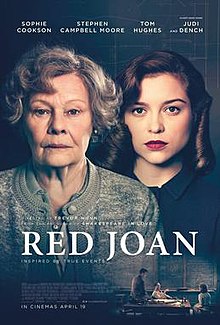
Number 5: Red Joan. Although the film has some story structure problems, and it woefully underused Judi Dench, I nonetheless enjoyed this film for what it had to say. It’s a fictional story, inspired by Melita Norwood, who worked for the BNF after WWII (and, indirectly, for the British Defense Department), in a role where she was able to pass on nuclear secrets to the Russians. After Hiroshima and Nagasaki, Joan concludes that the world is actually much less safe when only the US has access to nuclear bombs, and decides that the only way to fix that is to slip documents to the Russians. She, herself, is not a communist, and isn’t pushing for a communist Britain; she just thinks the best way to prevent more nuclear bombs being used is if more countries have the technology to build nukes. When she’s finally found out, years after retirement, that is essentially her defence (her son/lawyer points out that history seems to have proven her correct). It’s rare for this kind of film to argue that maybe breaking the rules is the right thing to do, but that’s probably an important message.
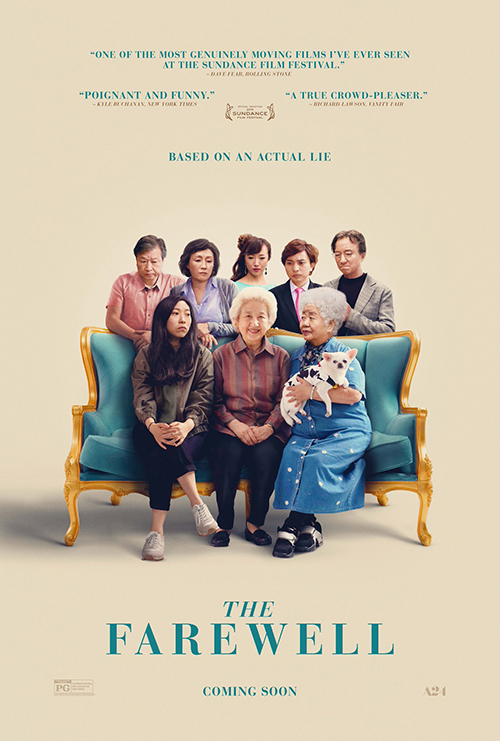
Number 4: The Farewell. There are some moments of awkward pacing in this film, and it feels very indie. But it ends up being really quite beautiful. The story centres on Billi Wang (played by Awkwafina), a not-terribly-successful Chinese-American writer, who learns from her parents that her grandmother, Nai Nai (who lives in China, and with whom Billi is very close), has been diagnosed with terminal cancer and has been given a few months to live. The family decides against telling Nai Nai of her condition, and conspires to gather the entire family in China for a hastily-arranged wedding between Billi’s cousin, Hao Hao, and his Japanese girlfriend, Aiko. Billi struggles with the idea of deceiving her grandmother, but her family insists that’s because she’s acculturated as American, and that by keeping this knowledge from Nai Nai, she’ll be able to enjoy her life more.
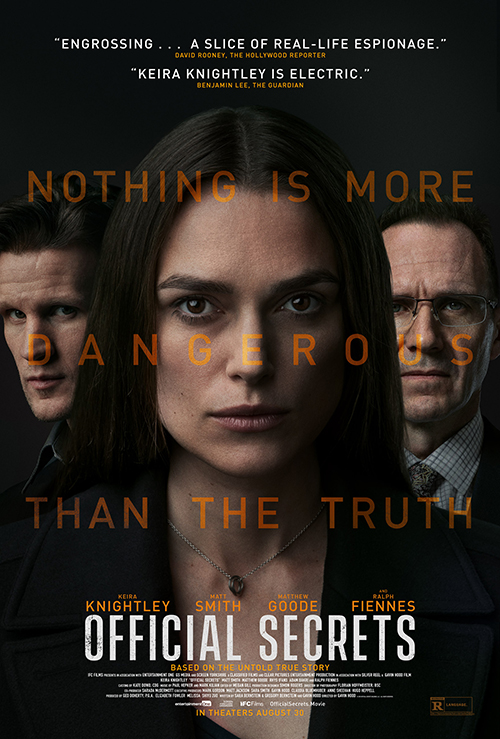
Number 3: Official Secrets. This film basically recounts the story of Katherine Gun, the British GCHQ civil servant who leaks an email to the press, in which the US has asked for GCHQ’s help gathering intelligence (blackmail material, basically) on certain UN diplomats for the purposes of influencing their vote on the 2003 invasion of Iraq. Shortly after doing so, Gun confesses her actions and faces a criminal trial for violating the UK Official Secrets Act. I particularly enjoyed a lot of the legal arguments the film played with. At one point, when Gun is being interviewed by the authorities, they say, “you served the British government,” and she retorts, “No, I served the British people.”
Over the last few years, I feel that there have been a number of films attempting to grapple the US and UK governments’ roles in fabricating a justification for invading Iraq: Shock and Awe, Vice and others. Official Secrets feels like a more successful treatment of that topic, possibly because its focus was so much narrower. But also: I think most Americans aren’t ready to admit that they chose to remain willfully ignorant of something that was painfully apparent at the time: that the invasion of Iraq and deaths of hundreds of thousands of Iraqis was justified by lies. The UK has grappled with that legacy a bit better: Blair will forever be remembered as a liar. But if you say that baby Bush was a war criminal, people believe that you’re part of some extreme fringe left.
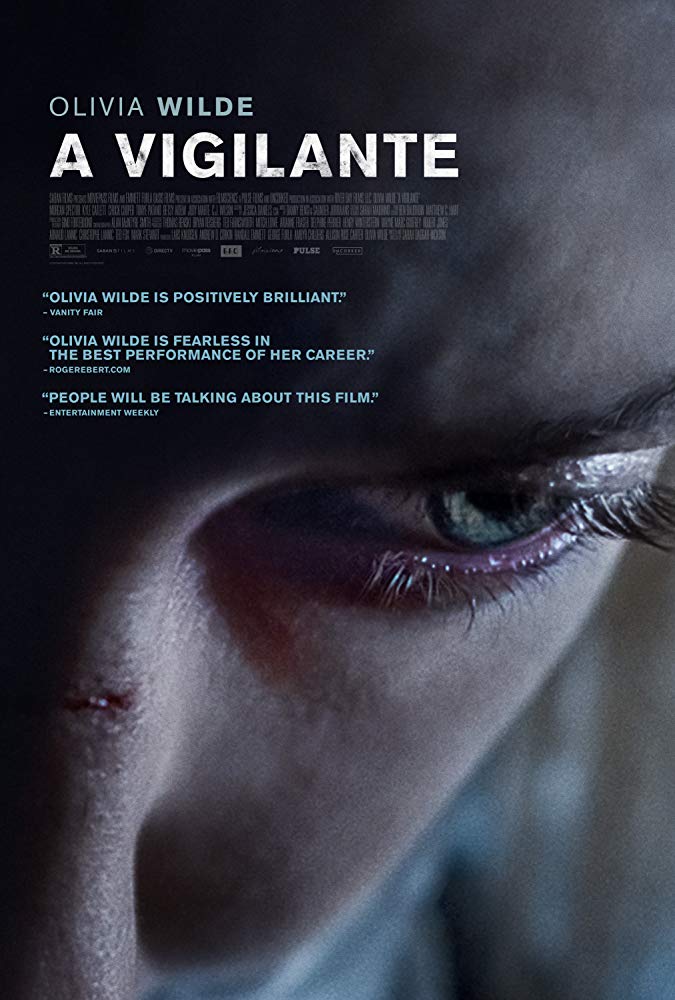
Number 2: A Vigilante. I was hooked on seeing this movie after watching the trailer, which is very evocative. Olivia Wilde plays Sadie, a woman who has left an abusive relationship (although her survivalist ex is off-grid and on the run from authorities, and she spends a certain amount of her spare time grid-searching wooded areas looking for him). And she’s decided that she’s going to intervene in other abusive relationships and beat the shit out of the abusers. It’s a sparse and visceral film, which is how I often like my movies.
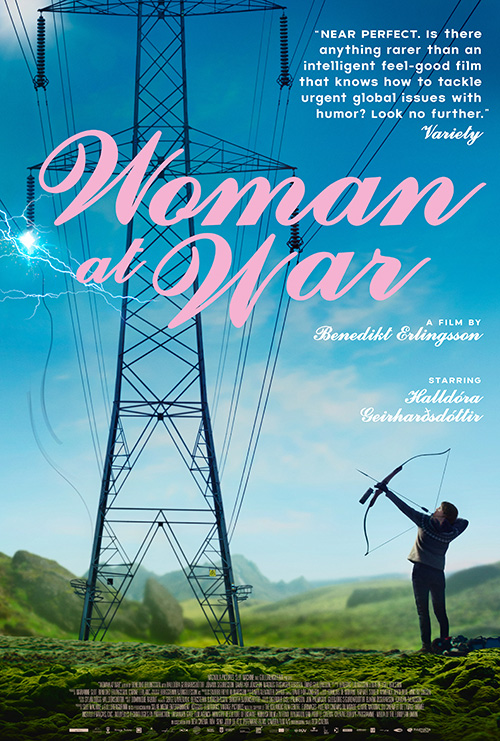
Number 1: Woman at War. Halla is an Icelandic woman who conducts a choir. But in her spare time, she’s an eco-activist, and commits acts of sabotage against the local aluminium plant. Usually this involves damaging the electricity pylons that support the wires that power the plant. She’s been at this for a while, and the government is stepping up its attempts to catch her. And then, one day, she gets contacted regarding an application to adopt a child that she pretty-much forgot that she’s submitted. A Ukrainian child is ready to be adopted. And she has that dilemma that I’m sure a lot of women can relate to: is she going to have to give up her life of eco-terrorism to be a mother?
It’s surprisingly light-hearted for a film about sabotage. And it also does this amusing thing with the music: the musicians end up in scenes with her. She’ll be running through an empty field, with bompy, friendly music going on, and then she’ll pass the band, playing the music that we’re listening to. Over time, the musicians start to react to the situations in the film: at one point, she’s in her rehearsal hall photocopying copies of her manifesto when she thinks she hears someone come in to the building. And the musicians, who are there, all start trying to listen to see if they can hear someone as well. And so forth. After her meeting about the adoption application, we suddenly also get a trio of Ukrainian choir singers joining the non-diagetic music, and of course, they show up in scenes as well. All in all, an absolutely delightful film.
Apparently they’re going to do an American remake (because of subtitles, no doubt), but I can’t imagine it offering much over and above this version.
Okay, runners-up:
I liked The Front Runner, but am ultimately torn about its message: it seemed to be espousing an indignance that at some point politicians stopped being allowed a private life (in which they could have affairs) and that elections stopped being about policy and instead about scandals. All is True was in interesting character study of Shakespeare’s declining years and his obsession with dead sons over living daughters.
I keep surprising myself in terms of how much I like the Creed movies. Mostly I find sports movies unoriginal. Creed was basically a retread of Rocky, and the more recent Creed II delved more into the Rocky lore by bringing in a competition between Adonis Creed and the son of Ivan Drago, the former Soviet boxer responsible for the death of Adonis’ father, Apollo Creed. Until the very end, it’s pretty much a paint-by-numbers movie. But the execution is so good — especially its use of music, including the classic, triumphant Rocky music — that it’s easy to just get swept up in the film.
Avengers: Endgame and Captain Marvel were fine enough. As much as I appreciate Captain Marvel, I feel like the final act of the movie was a mess in much the same was that Wonder Woman was a mess. It’s a big CGI-powers-palooza with no real stakes. I wanted to love it as much as I loved Black Panther and I’m sad to report that I did not.
Toy Story 4 was not as good as the 3rd movie. But by the end it changed the status quo in a way I didn’t expect, and that made me verklempt. I’m not sure what to make of the idea of feral toys, though. But my favourite animated movie this year was probably Ralph Breaks the Internet, which includes the song, “A Place Called Slaughter Race”, which is possibly the best musical number I’ve seen in a long, long time.
My friend, Sabs, points out that El Camino has no reason to exist, and it’s all fan service, but it’s totally great fan service. And The ■■■■■■■ Report was another “wrestling with the legacy of fucked up post-9/11 policy,” and it makes its point well, but it’s still gob-smaking that it needs to make its point at all.
Films I didn’t like. I had high hopes for John Wick: Parabellum that were dashed upon the rocks. It’s not a terrible movie, but given how surprisingly good the first two films were, I was disappointed in the third. Ad Astra was really bad. Like, really, really bad.
